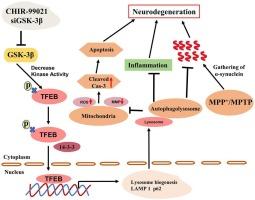GSK-3β inhibitor amplifies autophagy-lysosomal pathways by regulating TFEB in Parkinson's disease models
IF 4.2
2区 医学
Q1 NEUROSCIENCES
引用次数: 0
Abstract
Parkinson's disease (PD), a common neurodegenerative disorder characterized by degeneration of the substantia nigra and a marked increase in Lewy bodies in the brain, primarily manifests as motor dysfunction. Glycogen synthase kinase-3 beta (GSK-3β) is known to play a critical role in various pathological processes of neurodegenerative diseases. However, the impact of GSK-3β inhibitors on PD progression and the underlying molecular mechanisms responsible for the effects have not been fully elucidated. Using in vitro and mouse models of 1-methyl-4-phenylpyridine (MPP+)-or methyl-4-phenyl-1,2,3,6-tetrahydropyridine (MPTP)-induced PD, we found that inhibition of GSK-3β activity alleviated mitochondrial damage, cell apoptosis, and neuronal cell loss by promoting the nuclear translocation of transcription factor EB (TFEB), thereby amplifying the autophagy-lysosomal pathway (ALP). Importantly, siRNA silencing of the TFEB gene impaired the GSK-3β inhibitor-mediated activation of the ALP pathway, thus negating the metabolic support required for neuronal functional improvement. Short-term treatment with the GSK-3β inhibitor significantly ameliorated motor dysfunction and improved motor coordination in model mice with MPTP-induced PD. GSK-3β inhibition increased the ALP and TFEB activities in the mice, thereby reducing α-synuclein aggregation and neuronal damage. In conclusion, our study demonstrates that inhibition of GSK-3β activity can delay the pathological processes of PD via promotion of the TFEB–ALP pathway, potentially providing a novel therapeutic target for this neurodegenerative disorder.

在帕金森病模型中,GSK-3β抑制剂通过调节TFEB扩大自噬-溶酶体途径。
帕金森病(Parkinson's disease,PD)是一种常见的神经退行性疾病,以黑质变性和脑内路易体明显增多为特征,主要表现为运动功能障碍。众所周知,糖原合酶激酶-3β(GSK-3β)在神经退行性疾病的各种病理过程中发挥着关键作用。然而,GSK-3β抑制剂对帕金森病进展的影响以及导致这种影响的潜在分子机制尚未完全阐明。我们利用体外和小鼠模型研究了1-甲基-4-苯基吡啶(MPP+)-或甲基-4-苯基-1,2,3,6-四氢吡啶(MPTP)-诱导的帕金森病,发现抑制GSK-3β活性可通过促进转录因子EB(TFEB)的核转位,从而扩大自噬-溶酶体途径(ALP),减轻线粒体损伤、细胞凋亡和神经细胞丢失。重要的是,siRNA 沉默 TFEB 基因会损害 GSK-3β 抑制剂介导的 ALP 通路激活,从而抵消神经元功能改善所需的代谢支持。GSK-3β抑制剂的短期治疗显著改善了运动功能障碍,并改善了MPTP诱导的帕金森病模型小鼠的运动协调性。GSK-3β抑制剂可提高小鼠的ALP和TFEB活性,从而减少α-突触核蛋白聚集和神经元损伤。总之,我们的研究表明,抑制GSK-3β的活性可通过促进TFEB-ALP通路延缓帕金森病的病理过程,从而有可能为这种神经退行性疾病提供一种新的治疗靶点。
本文章由计算机程序翻译,如有差异,请以英文原文为准。
求助全文
约1分钟内获得全文
求助全文
来源期刊

Experimental Neurology
医学-神经科学
CiteScore
10.10
自引率
3.80%
发文量
258
审稿时长
42 days
期刊介绍:
Experimental Neurology, a Journal of Neuroscience Research, publishes original research in neuroscience with a particular emphasis on novel findings in neural development, regeneration, plasticity and transplantation. The journal has focused on research concerning basic mechanisms underlying neurological disorders.
 求助内容:
求助内容: 应助结果提醒方式:
应助结果提醒方式:


